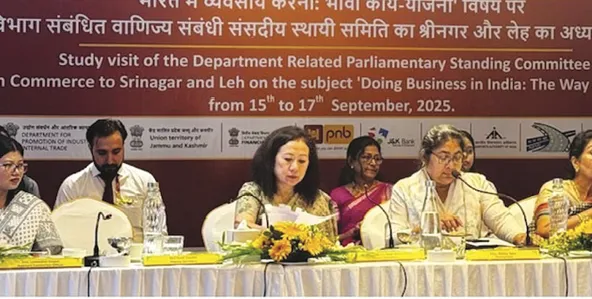Srinagar, Sep 15: A delegation of the Kashmir Chamber of Commerce and Industry (KCCI) on Monday raised a series of pressing issues before the Parliamentary Standing Committee on Commerce, urging urgent interventions to revive Jammu and Kashmir’s struggling trade, industry, and export sectors.
The delegation, led by Senior Vice President Ashiq Hussain Shangloo and Joint Secretary General Umer Nazir Tibetbaqal, met the Committee headed by Chairperson Dola Sen at Srinagar. The meeting was attended by several Members of Parliament, including Renuka Chowdhury, Yusuf Pathan, Prasun Banerjee and others.
KCCI submitted a detailed memorandum flagging bureaucratic delays that continue to frustrate entrepreneurs despite the Centre’s push for Ease of Doing Business. The Chamber said multiple clearances and recurring NoC requirements have left hoteliers and industrialists stuck in an endless loop of paperwork, calling for a genuine single-window clearance system “in both letter and spirit.”
On the industrial front, the Chamber pointed out that for the first time in decades, J&K is without an operational incentive scheme. The earlier ₹28,400 crore New Central Sector Scheme was exhausted last year, while the UT administration has sought an additional ₹75,000 crore. KCCI demanded that at least 25 percent of allocations in any new package be reserved for local entrepreneurs.
Highlighting infrastructure gaps, the delegation said the absence of warehousing and logistics hubs continues to inflict heavy losses on traders and fruit growers, who remain hostage to frequent closures of NH-44. They recommended a logistics park in Kashmir and more parcel trains, particularly during harvest and winter months.
The Chamber also flagged the sharp decline in handicraft exports—from ₹1,162 crore in 2023–24 to ₹733 crore in 2024–25—and proposed setting up warehousing facilities abroad, including Bharat Mart in Dubai, alongside an Inland Container Depot in Kashmir. It further sought reintroduction of the 3 percent interest subvention on export finance.
On the IT and electronics sector, KCCI underlined Kashmir’s untapped potential and urged the inclusion of Kashmiri startups in global trade fairs and official delegations. It also called for 500 modern looms for artisans this year and NABL accreditation for the new Pashmina fibre testing lab at SKUAST-K to reduce reliance on Dehradun facilities.
Regarding the proposed “Golden Pashmina Brand,” KCCI said certification must be restricted strictly to 100 percent handmade Pashmina, warning against dilution through fibre mixes.
Credit access also figured prominently, with KCCI urging the Reserve Bank of India to create relaxations for entrepreneurs penalised by low or erroneous CIBIL scores. They recommended a government-backed mechanism for reassessing such cases, noting that many businesses had been disrupted by conflict and natural calamities but remain viable today.
The delegation expressed hope that the Committee’s visit would translate into tangible policy measures. “J&K’s economic revival depends on targeted interventions in trade, industry, horticulture, handicrafts, and IT. The challenges are systemic, but the opportunities are immense,” the Chamber said.








